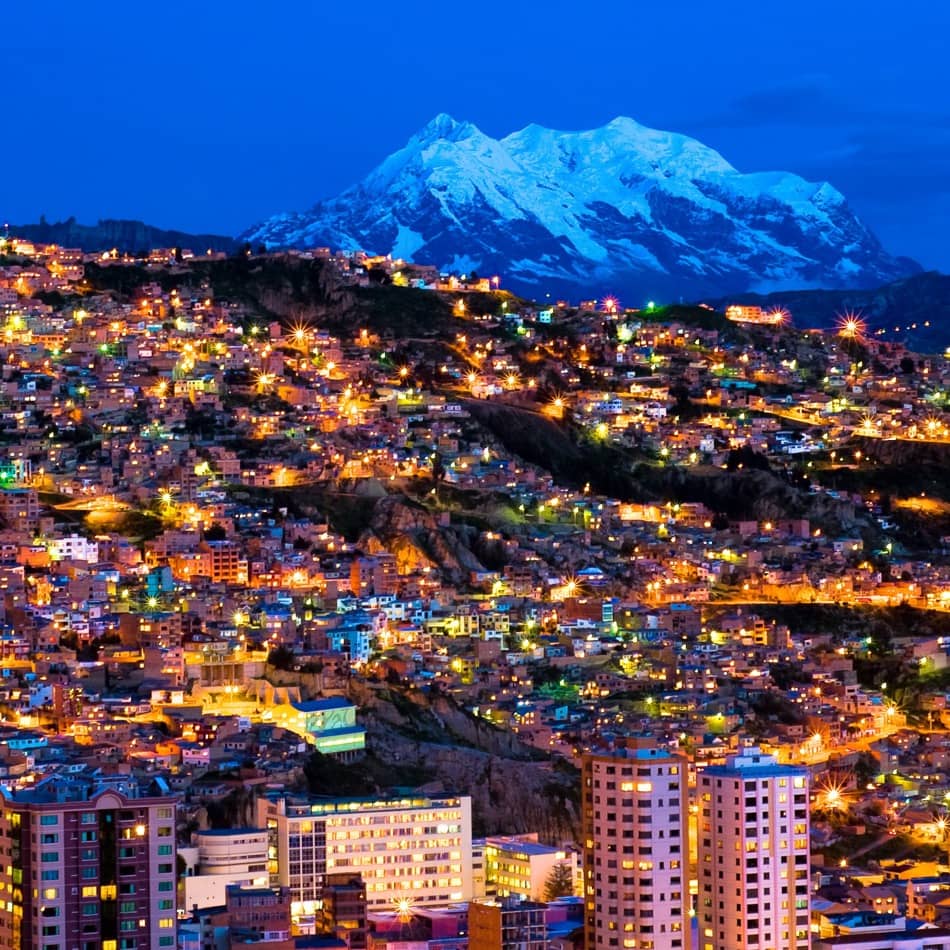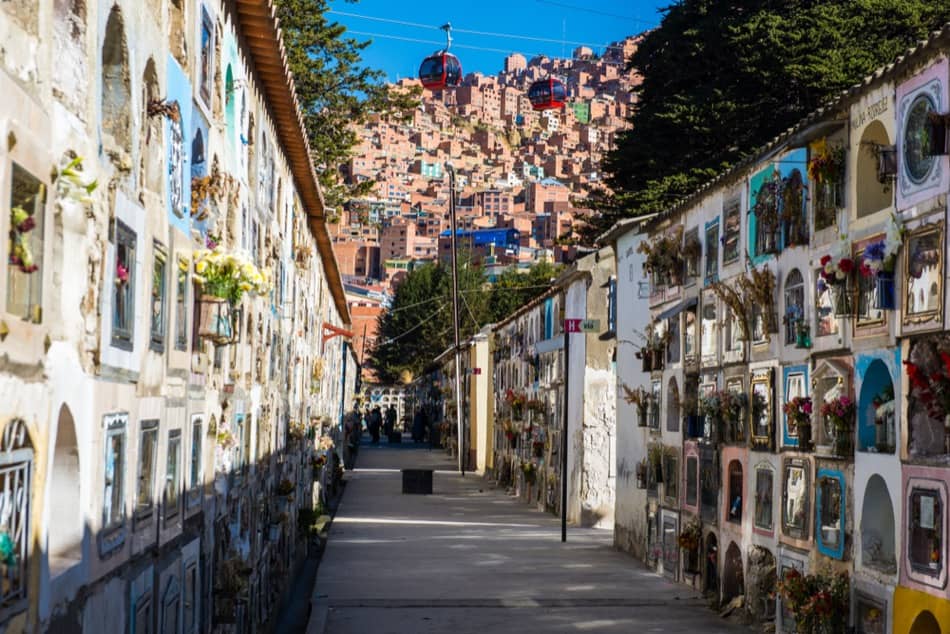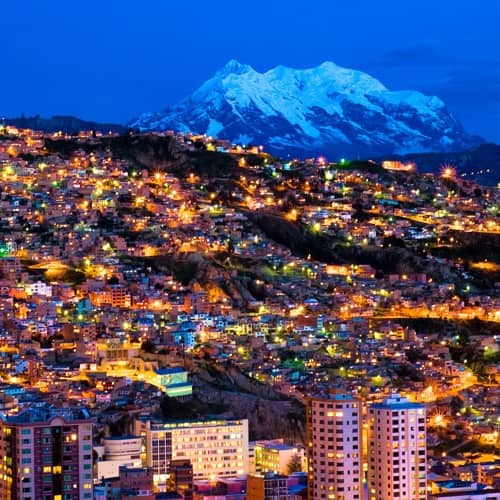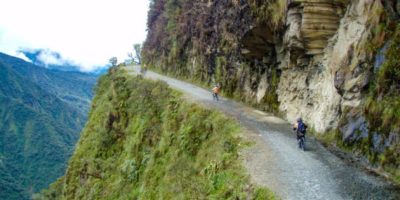La Paz, the bustling administrative capital of Bolivia, is a captivating city nestled in the Andes Mountains. With its unique blend of indigenous culture, colonial architecture, and modern amenities, La Paz attracts travelers from around the globe.
However, as with any major city, safety concerns are a reality that visitors must consider. In this comprehensive guide, we’ll explore the various aspects of safety in La Paz, providing essential information and tips to ensure a secure and enjoyable stay in this fascinating Bolivian metropolis.
| Safe Areas | Unsafe Areas |
|---|---|
| Zona Sur (Calacoto, San Miguel, Achumani) | Downtown La Paz (especially at night) |
| Sopocachi | El Alto (particularly at night) |
| Miraflores | Coronilla Hill (near main bus terminal) |
| Obrajes | Cementerio District |
| Irpavi | Villa Fátima |
| Mallasa | Ciudadela Ferroviaria |
| Auquisamaña | Barrio Gráfico |

Contents
Which areas to avoid in La Paz
After dark, it’s best to avoid the El Alto area. The Chapare region, Altiplano and North Yungas (bad and dangerous roads due to the way of driving) are also avoidable.
If you haven't booked your hotel yet, you can get the best deals on hotels here.
Understanding Safety in La Paz: An Overview
General Safety Situation in La Paz
When it comes to overall safety, La Paz presents a mixed picture. While the city has its share of crime and security issues, it is generally considered safer than many other major South American cities. Petty crime, such as pickpocketing and bag snatching, is the most common concern for tourists. However, more serious crimes, including violent assaults and express kidnappings, do occur in certain areas.
How Safe is La Paz Compared to Other South American Cities?
Compared to other major cities in South America, La Paz ranks relatively well in terms of safety. According to the 2023 Global Peace Index, Bolivia ranks 77th out of 162 countries, placing it ahead of several other South American nations, such as Ecuador (96th) and Peru (102nd). However, it’s essential to note that safety conditions can vary significantly within the city itself.
Crime Rates and Types in La Paz, Bolivia
Common Crimes Tourists Should Be Aware Of
Tourists in La Paz should be particularly vigilant against the following common crimes:
- Pickpocketing and bag snatching: These opportunistic crimes are prevalent in crowded areas, such as markets, public transportation, and tourist hotspots.
- Theft from accommodations: Thieves may target hotels and hostels, especially those with lax security measures.
- Express kidnappings: In this crime, victims are typically held hostage and forced to withdraw money from ATMs.
- Scams and fraud: Tourists may encounter various scams, such as fake police officers, counterfeit money, and overcharging taxi drivers.
Areas with Higher Crime Rates in La Paz
Certain areas in La Paz are known for higher crime rates and should be approached with caution:
- Downtown La Paz: The city center, particularly around tourist attractions and public transportation hubs, is a hotspot for petty crime.
- El Alto: This sprawling satellite city above La Paz has a reputation for higher crime rates and should be avoided at night.
- Coronilla Hill: Located near the main bus terminal in Cochabamba, this area is known for drug-related crime and violence.
In contrast, the affluent South District, which includes neighborhoods like Calacoto, La Florida, San Miguel, and Achumani, is considered the safest part of La Paz.

Safety Tips for Travelers in La Paz
Staying Safe While Exploring La Paz: Essential Precautions
To minimize safety risks while discovering the wonders of La Paz, consider the following precautions:
- Be aware of your surroundings: Stay vigilant, especially in crowded areas and tourist hotspots.
- Keep valuables secure: Use a money belt or hidden pouch to store important documents, credit cards, and cash.
- Avoid displaying wealth: Refrain from wearing expensive jewelry or carrying high-end electronics in public.
- Stay in well-lit, populated areas: Avoid walking alone in isolated or poorly lit streets, particularly at night.
- Trust your instincts: If a situation feels unsafe or suspicious, remove yourself from it immediately.
Transportation Safety: Getting Around La Paz Securely
When navigating the streets of La Paz, keep these transportation safety tips in mind:
- Use registered taxis: Stick to official, licensed taxi companies and avoid hailing cabs off the street, especially at night.
- Be cautious with public transportation: While generally safe during the day, exercise increased vigilance on buses and minivans, as pickpocketing and theft can occur.
- Consider guided tours: For visits to remote areas or unfamiliar neighborhoods, opting for a reputable guided tour can provide an added layer of safety.
Is La Paz Safe for Solo Travelers?
Safety Considerations for Women Traveling Alone in La Paz
Solo female travelers in La Paz should take extra precautions to ensure their safety:
- Dress modestly: Avoid drawing unwanted attention by dressing conservatively and blending in with the local culture.
- Stay in well-reviewed accommodations: Choose hostels or hotels with good security measures and positive reviews from other solo female travelers.
- Join group activities: Participating in group tours or activities can provide a sense of safety and camaraderie.
Tips for Solo Male Travelers in La Paz
While solo male travelers may face fewer gender-specific risks, they should still prioritize safety:
- Avoid excessive alcohol consumption: Drinking too much can impair judgment and increase vulnerability to crime.
- Be cautious when meeting new people: While it’s great to make new friends, be wary of overly friendly strangers or those offering unsolicited assistance.
La Paz Safety at Night: What You Need to Know
Safe Nightlife Areas in La Paz
When exploring La Paz’s vibrant nightlife, stick to safer, well-known areas:
- Sopocachi: This trendy neighborhood is home to numerous bars, restaurants, and cafes, and is generally considered safe for evening outings.
- Zona Sur: The upscale South District offers a variety of nightlife options, with a lower risk of crime compared to other areas.
Precautions for Nighttime Activities
To stay safe while enjoying La Paz’s nightlife, keep these precautions in mind:
- Go out in groups: Avoid walking alone at night, and stick with trusted friends or fellow travelers.
- Watch your drinks: Be aware of the risk of spiked drinks, and never leave your beverage unattended.
- Arrange transportation in advance: Plan your route home before heading out, and use licensed taxis or ride-sharing services.
Health and Medical Safety in La Paz
Altitude Sickness: A Major Concern in La Paz
La Paz’s high altitude (3,640 meters or 11,942 feet above sea level) puts visitors at risk of altitude sickness. Symptoms may include:
- Headache
- Nausea
- Fatigue
- Shortness of breath
To minimize the risk of altitude sickness, give yourself time to acclimatize, stay hydrated, and avoid excessive physical exertion in the first few days.
Accessing Medical Care Safely in La Paz
In case of a medical emergency, La Paz offers several reputable healthcare facilities:
- Clínica Alemana: This private clinic provides high-quality medical care and has English-speaking staff.
- Hospital Arco Iris: A well-equipped private hospital with a good reputation among expatriates and travelers.
Always ensure you have comprehensive travel insurance that covers medical emergencies and evacuation before traveling to La Paz.
Natural Disasters and Environmental Hazards in La Paz
Landslides and Flooding: Seasonal Risks in La Paz
During the rainy season (November to March), La Paz is prone to landslides and flooding. Stay informed about weather conditions and follow local authorities’ advice.
Air Quality and Pollution Concerns
La Paz’s high altitude and dense traffic can contribute to poor air quality. Those with respiratory issues should take necessary precautions and limit outdoor activities during high pollution days.
Political Stability and Its Impact on Safety in La Paz

Recent Political Developments Affecting Safety
Bolivia has experienced political instability in recent years, with protests and demonstrations occasionally turning violent. Stay updated on the current political situation and avoid areas where demonstrations are taking place.
Avoiding Protests and Demonstrations
If you encounter a protest or demonstration in La Paz:
- Keep a safe distance and avoid getting involved.
- Follow the instructions of local authorities and your accommodation provider.
- Have alternative travel plans in case of transportation disruptions.
Is La Paz Safe for Families and Children?
Family-Friendly Areas and Activities in La Paz
La Paz offers several safe, family-friendly areas and activities:
- Parque Urbano Central: This expansive park features playgrounds, green spaces, and a variety of recreational activities.
- Mi Teleférico: The city’s cable car system provides a safe and scenic way to explore La Paz with children.
- Museo de Coca: This fascinating museum offers an educational experience about the history and cultural significance of coca leaves.
Safety Measures for Traveling with Kids in La Paz
When exploring La Paz with children, prioritize their safety:
- Keep a close eye on your children in crowded areas to prevent separation.
- Ensure your accommodations have child-friendly facilities and safety measures.
- Be cautious with street food and tap water to avoid foodborne illnesses.
Local Laws and Customs: Staying Safe and Respectful
Important Laws Tourists Should Know in La Paz
Familiarize yourself with La Paz’s local laws to avoid legal trouble:
- Drug possession and trafficking carry severe penalties in Bolivia.
- Photography of military installations, airports, and government buildings is prohibited.
- Carry a copy of your passport at all times for identification purposes.
Cultural Sensitivities and Etiquette for Safety
Respecting local customs and etiquette can contribute to a safer and more enjoyable experience in La Paz:
- Dress modestly, especially when visiting religious sites.
- Ask for permission before photographing individuals or cultural events.
- Be respectful of indigenous cultures and their traditions.
Emergency Services and Resources in La Paz
Important Emergency Numbers in La Paz
In case of an emergency, keep these important numbers handy:
- Police: 110
- Fire Department: 119
- Ambulance: 118
- Tourist Police (English-speaking): 222-5016
Embassy and Consulate Information for Travelers
Before traveling to La Paz, make note of your country’s embassy or consulate contact information:
| Country | Embassy/Consulate | Address | Phone Number |
|---|---|---|---|
| United States | U.S. Embassy in La Paz | Avenida Arce 2780, La Paz | +591 2-216-8000 |
| United Kingdom | British Embassy in La Paz | Avenida Arce 2732, La Paz | +591 2-243-3424 |
| Canada | Embassy of Canada in La Paz | Avenida Arce 2443, La Paz | +591 2-244-1400 |
| Australia | Honorary Consulate of Australia in La Paz | Calle 11 de Calacoto 7720, La Paz | +591 2-279-6124 |
While La Paz does present some safety concerns, travelers can minimize risks by staying informed, taking necessary precautions, and remaining vigilant. By following the tips and advice outlined in this comprehensive guide, visitors can safely enjoy the unique beauty, culture, and experiences that this captivating Bolivian city has to offer.

























